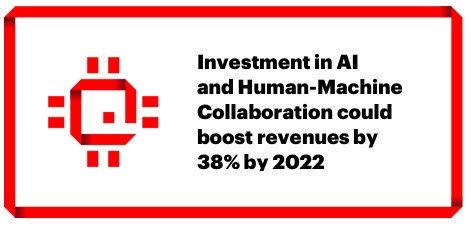The Advisor's View of Long-Term Care Planning
Never miss any update
Subscribe to the Advisor's View of Long-Term Care Planning newsletter today to receive updates on the latest news from our carriers.
Your privacy is important to us. We have developed a Privacy Policy that covers how we collect, use, disclose, transfer, and store your information.
Four Ways AI is going to impact the LTC Insurance industry

When most people think of artificial intelligence (AI), they first think of some of the great science fiction movies and television shows that depict smart computers, robots and networks. From HAL9000 in the movie 2001, A Space
Odyssey, up to the current TV show Westworld. Most of these stories depict the scary unknown of AI and how it could threaten humanity.
Our daily reality, however, is that AI has already impacted our daily lives in amazing ways that we now take for granted. For example, Google Search is a form of artificial intelligence when you are looking for something. Netflix
uses AI to make recommendations to you. Devices such as Amazon Alexa, Google Assistant and Apple Siri use AI to respond to voice commands and learn over time what the best answers are.
If you participate in the LTC planning process, you will want to know the potential impact to your business even if you aren’t a technology expert. When we talk about the impact of AI, we are looking at things such as the development of better algorithms and the rise of "machine learning" and "deep learning". Here’s a brief description of each:
Algorithm. An algorithm is simply a sequence of programmed instructions (or rules) that tells a computer what to do. As discussed earlier, one of the well-known algorithms is that used for doing an online search. Type “LTC Insurance” into the Google search bar and an algorithm will determine which results are displayed. The better this algorithm is designed, the more accurate and helpful the information will be for the person performing the search.
Machine Learning. Machine learning helps make predictions based on data and learned experience. The computer models will look for patterns in data that can lead to more accurate results of questions that are being asked.
Deep Learning. Deep learning is a step beyond simply follow an algorithm. In the case of deep learning, the computer will play out different scenarios to come up with potentially new ways of doing things. It’s used in things like speech recognition, face recognition, and other pattern recognition systems. This process allows computers to win at almost any game with defined rules.
According to Accenture Strategy’s Reworking the Revolution report, if businesses invest in AI and human-machine collaboration at the same rate as top-performing companies, they could boost revenues by upwards of 38 percent. They could also raise employment levels by 10 percent by 2022.

Based on that background, here are four ways that artificial intelligence could dramatically impact the long-term care insurance industry:
1. Prospecting and Finding New Clients
The internet and AI will dramatically change the way LTC Insurance advisors prospect for new clients. No longer do salespeople simply have to rely on referrals or cold calling to find new prospects for LTC insurance. With AI, if you know the characteristics of long-term care buyers then the technology can be used to find potential buyers in any dataset with similar patterns. As an example, if we knew that the average LTC Insurance buyer purchased a plan four years after hiring professional long-term care for a parent, you would want to make sure that the adult children of people currently receiving care were included in a target list of prospects. Other known profiles of buyers such as education attainment and address can hint who might be good prospects. Where you find these prospects has expanded far beyond direct mail pieces. Online platforms such as Facebook, Google, Twitter and LinkedIn allow for targeting of consumers and businesses that may be interested in LTC Insurance. These platforms allow anyone to set up advertising and targeting accounts within budget. The flipside is: AI will also allow consumers to have easier access to information, giving them more control over how (and with whom) they do business.
Consumers will do very specific searches online, such as: "When is the best time to buy long-term care
insurance?" LTC advisors can use this to their advantage with a strong online presence, demonstrating robust LTC
expertise via custom websites, published articles, blogs, and social media accounts. Online search algorithms
tend to identify the organizations with the greatest web presence first.
2. Longevity,Cost of Care and Insurability
Once someone has made the decision to plan for care, they’ll need to have a way to project when they need care, how much it will cost, and if LTC Insurance is even an option. Artificial Intelligence can play an important role in helping these different areas. First, let us look at how to project how long someone will live and how much care they will need. Currently, the tools most people use are one-size-fits-all. Look at the life expectancy for the U.S. population at certain ages, figure the overall odds of needing LTC, and look at the average length of stay. This can provide a very rough estimate of when care will begin and how long it will last. One example of a company utilizing AI to provide more personalized answers to these difficult questions
is Genevity, a startup that includes data scientists with experience in genetics. Genevity's HALO (Health Analysis and Longevity Optimizer), asks a series of questions to prospective clients, including lifestyle and family health information. With the responses, HALO calculates how long someone will live and require care. The AI in this case, HALO, compares a client's answers with a dataset of a large portion of the U.S. population. (Visit here to run a HALO on yourself).
The same type of AI tools can be used to do better field underwriting. Property and casualty insurers are well
ahead of LTC carriers in this regard. P & C companies use a variety of data points in determining who is a good risk—from credit scores to buying and traveling habits. It is why you can go online and get instant rate quotes on car or home insurance. This technology will eventually trickle down to life and LTC carriers, resulting in much faster underwriting. Finally, AI will be used to more accurately predict the cost of future long-term care. Models will be created that take into account the current cost of care while also better predicting the impact of economic factors (i.e. economic trends, real estate costs, changes in the labor force, etc.) on future costs of care. Combining these models with personalized choices—such as staying at home versus living in senior housing—will create better cost-of-care projections than currently available.
3. Using AI to make recommendations on LTC Insurance Solutions
If artificial intelligence can help make better predictions on the cost of care, length of care and insurability, the next natural step is to use AI to make plan recommendations. Yes, this is the part of the story where AI threatens human
jobs such as designing LTC plans! The gut reaction of many is to declare that computers can never replace humans for this type of work. "Replace" might be too strong of a word. Instead, AI should complement the work LTC planning specialists do and help people make better decisions. How would an AI assistant for plan design work? Some examples already exist. One company, Jellyvision, created software that helps employees make better informed decisions as to the type of health insurance from which they could best benefit. During the open enrollment process, a virtual assistant named Alex asks the employee a series of questions. The answers are used to make a recommendation on a health insurance plan. Another example of a virtual helper is a “chatbot"— having an online discussion with a virtual (i.e. non-human) helper. Progressive Insurance offers online chats and instant quotes featuring their famous media icon, Flo.
The same type of technology options can be used to help consumers buy LTC Insurance. An online tool could pose a series of questions to make a product recommendation, such as: interest in reimbursement versus cash indemnity; the need for premium guarantees; premium tolerance; etc.
4. Policyholder Claim Management
How will AI impact policyholders? Insurance carriers are interested in reducing claim costs by encouraging healthy habits of existing policyholders. Some carriers are already introducing wellness initiatives to their policyholders,
tracking lifestyle feedback from their customers that includes activity levels and weight management. A new startup called Well.Said, Inc. (www.wellsaid.ai) is looking to go further. They want to use the technology used in devices like Amazon Alexa to create a “skill” to allow seniors to spend more time at home and avoid going to a nursing home. A “skill” is a program that is added to the Alexa voice recognition application. The skill Well.Said has created is called Better Every Day. It helps seniors complete everyday tasks, like remembering to take medication; encouraging stretching and exercise; and helping stay connected with loved ones. With the Better Every Day program, an adult child who may not be living with the senior parent will get updates on how the day went. The AI can recognize patterns in
behavior that may indicate trouble ahead.This technology is very win-win. It will help the senior stay in their home while keeping the caregiver apprised of what is going on. The insurance carrier may be able to delay a future claim. With billions of potential future LTC claims, look for AI to make a noticable impact.
These are just some of the ways that artificial intelligence technology will impact LTC Insurance. If it helps people plan for care, it is great news. This is an exciting time to be part of the LTC industry and to help people plan for the future.
This article was first published in the 3rd quarter of the 2018 CLTC Journal. Learn more about the CLTC program at https://www.ltc-cltc.com/.